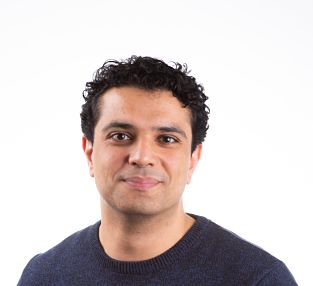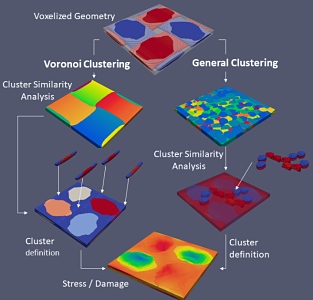The grant will support Dr Elsaied's work on data-driven multiscale modelling. The 2-year research project is titled 'Hybrid Statistical / Deterministic Multi-scale Modelling of 3D Woven Structures'.
The project is valued at £330,000 and will be done in partnership with Rolls-Royce, BAE Systems, and the National Composites Centre (NCC).
Composite materials are at the forefront of an engineering revolution targeting lighter, more reliable, and more fuel-efficient aerospace structures. Advanced composites are made from layers of long fibres bound together using a matrix to form the structure. As conventional composite materials are based on 2D fibre layers, they struggle with direct loading in the third direction. 3D Composites are a viable solution to this issue as they are made from fibres woven in all three dimensions.
However, modelling challenges have prevented engineers from taking full advantage of 3D composites. Traditionally, engineers and scientists test samples of the material to characterise its behaviour and then include this in the mathematical models that can predict the behaviour of structures. This conventional approach does not work for 3D composites.
During manufacturing, the 3D network of woven fibres deforms around corners and other structural features to conform to the structure geometry. This in turn means that the fibre network will have a different architecture for each part of the structure and consequently will have its own characteristic behaviour. As a result, simple material testing is no longer descriptive of the material behaviour and an alternative approach is needed.
Dr Elsaied's project aims to train models to detected repeating patterns that exist in a 3D woven network of fibres across a structure. These repeatable patterns will be characterised using highly detailed models to understand how each pattern behaves under different loading conditions and as part of multiple structures. A parameterised database containing thousands of repeatable patterns and their behaviour will be built using unsupervised machine learning.
This approach will allow engineers, for the first time, to design both the structure and the 3D fibre network forming it simultaneously, allowing them to understand 3D composites behaviour at a much deeper level than is currently possible.
Achieving the project's goal will allow us to build aerospace structures that consume less fuel, and that are lighter, cheaper, and faster to produce.
Dr Elsaied said: "I had a great sense of satisfaction and excitement when I was informed of this grant success. We chose a 'high risk, high reward' philosophy for this project. So, seeing that EPSRC is willing to get behind this vision gives me a great deal of confidence in this research direction. Also, as an early career researcher, becoming a Principal Investigator for the first time is an important milestone that I am very happy to achieve."

